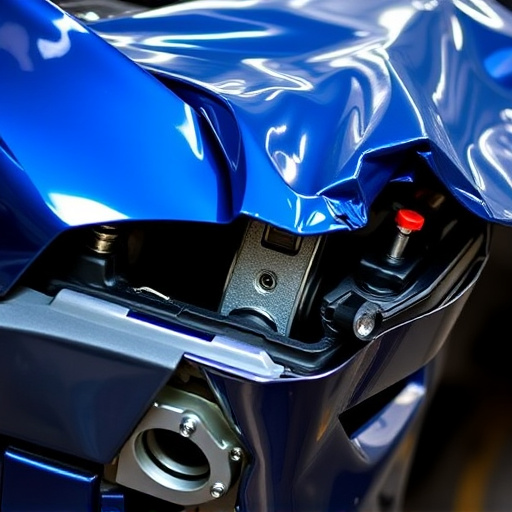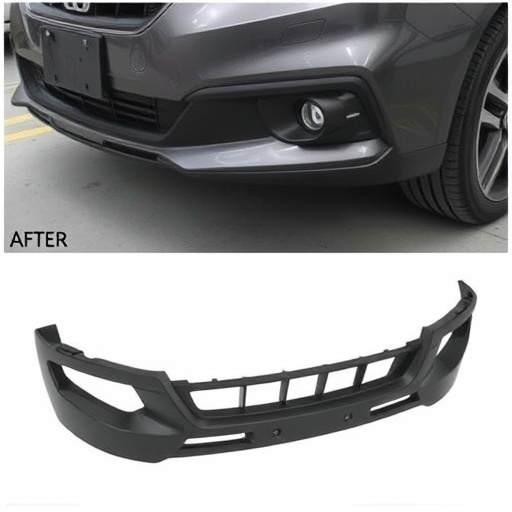Aluminum body components revolutionize automotive sustainability by reducing weight, enhancing fuel efficiency, and minimizing carbon emissions. Its durability and versatility facilitate efficient repairs, lower waste, and decrease manufacturing impacts. Compared to steel, aluminum's abundance, lower extraction needs, and infinite recyclability make it an eco-friendly choice. This sustainable approach conserves resources and minimizes vehicles' carbon footprints during production and repair.
Aluminum body components are leading the way in sustainable automotive design. This lightweight material offers a compelling combination of strength, durability, and environmental friendliness. In this article, we explore how aluminum’s unique properties contribute to significant reductions in resource extraction, manufacturing emissions, and overall carbon footprint. Discover why these eco-conscious choices aren’t just trends but essential steps towards a greener future for the automotive industry.
- Lightweight Materials: Aluminum's Role in Efficiency
- Reduced Resource Extraction and Recycling Potential
- Lower Carbon Footprint Throughout Manufacturing
Lightweight Materials: Aluminum's Role in Efficiency

Aluminum plays a pivotal role in promoting environmental sustainability within the automotive industry, particularly when incorporated into body components. Its exceptional lightweight properties make it an eco-friendly alternative to heavier materials traditionally used in car bodywork. This reduction in weight significantly enhances fuel efficiency and lowers carbon emissions, addressing a critical aspect of ecological preservation.
In the realm of fleet repair services and collision repair services, aluminum’s versatility allows for easier and more precise repairs, minimizing waste generation. The material’s durability ensures that even after years of use, aluminum body components retain their structural integrity, delaying the need for frequent replacements. This longevity translates to less environmental impact associated with manufacturing and disposal, making aluminum a preferred choice for those seeking sustainable transportation solutions.
Reduced Resource Extraction and Recycling Potential

The production of aluminum body components offers a significant advantage in terms of environmental sustainability. One of the key benefits is the reduced need for resource extraction compared to traditional metals like steel. Aluminum is abundant in nature, but its refinement process is less energy-intensive, leading to lower greenhouse gas emissions. This reduced extraction means fewer mines and less damage to ecosystems, preserving natural habitats and biodiversity.
Furthermore, aluminum’s remarkable recyclability makes it an eco-friendly choice for automotive body work. The metal can be recycled infinitely without any loss of quality, making it a sustainable alternative for car repair shops and fender repair services. This recycling potential is a game-changer, as it minimizes the environmental impact associated with manufacturing new components, which typically requires substantial energy and resources.
Lower Carbon Footprint Throughout Manufacturing

Aluminum body components have a distinct advantage when it comes to reducing a vehicle’s carbon footprint during manufacturing. Unlike traditional materials like steel, aluminum requires less energy to produce, which translates to lower greenhouse gas emissions. The process of making aluminum involves recycling and reusing materials, minimizing the need for extracting and processing new resources. This not only conserves energy but also significantly reduces the overall environmental impact of vehicle production.
In the event of a fender bender or minor collision at a tire services center or a vehicle body shop, using aluminum components can further contribute to sustainability. Aluminum is lightweight yet highly durable, which means it can withstand impacts better than heavier metals without compromising structural integrity. This reduces the demand for frequent replacements and minimizes waste from damaged parts, making it an eco-friendly choice for both manufacturing and repair processes.
Aluminum body components offer a compelling solution for environmentally conscious manufacturing. Their lightweight nature reduces fuel consumption and emissions, while their high recyclability minimizes resource extraction. Furthermore, aluminum’s production process results in a lower carbon footprint compared to traditional materials, making it an eco-friendly choice across the board. Adopting aluminum body components is not only beneficial for the planet but also sets a precedent for sustainable practices in the automotive industry.














